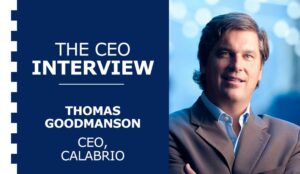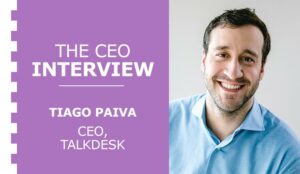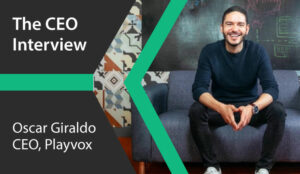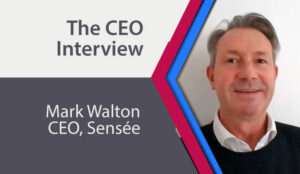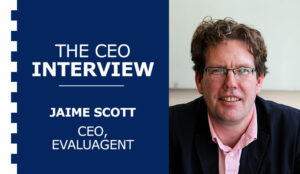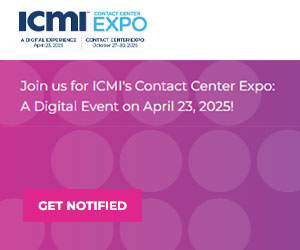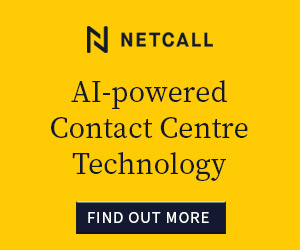Thomas Goodmanson introduces us to Calabrio, before discussing the growing importance of data to the contact centre and the future of chatbots.
Tell Us About Your History With the Company
“I joined as CEO in 2008 and since then we’ve grown from 20 people to 450 today and revenues have increased incredibly. It has been an amazing time here.”
“We’re a private company and until 2016 we had venture capital backing. But, since then, we sold the company to KKR – the investment firm.”
“So far, we’ve had a great run with them, keeping all the same people and all of the same things that were considered a platform investment for them. It has been a great relationship that has really helped us to progress.”
What Do You Attribute Your Success To?
“In 2008, there were many disparate technologies – such as WFM (workforce management), call recording software and so on – but we came in with the whole WFO (workforce optimisation) suite. We figured out what our focus was going to be and we’ve kept that focus.”
In 2008, there were many disparate technologies – such as WFM (workforce management), call recording software and so on – but we came in with the whole WFO (workforce optimisation) suite.
“Thankfully, we were a new enough company that we could be a software-only company, as we’ve never had hardware. We embraced VoIP (Voice over Internet Protocol) and allowed the market to grow with us.”
“While there’s a lot of players in the market, we’ve followed this roadmap for ten years and it has been very successful. I believe our latest release of Calabrio ONE reflects our ever-growing capabilities.”
How Has the Contact Centre Industry Changed Since You Became CEO?
“People are starting to realise the value of the Voice of the Customer (VoC) data that is stored within the contact centre, and vendors such as ourselves have recognised this.”
“Before, contact centres could only survey customers, but now we can record the call, see the chat and analyse the email and then do something with it.”
“So, the value of VoC data has grown greatly amongst forward-thinking companies, which has allowed this industry to stay and become even more relevant.”
What Do You Predict Will be the Biggest Change That Will Happen in the Industry in the Next Five Years?
Chatbots will be used more to automate the early part of a transaction, but we’re going to have to think of them differently.
“In terms of technology, AI (Artificial Intelligence) and automation will likely be implemented by more companies. For example, chatbots will be used more to automate the early part of a transaction, but we’re going to have to think of them differently.”
“We need to look at the overall effectiveness of chatbots and do normalised QA (quality analysis) against them, as we would an advisor, to ensure that we tune them better and improve interactions.”
“We will, however, then have to think more about how we train human advisors, because bots are going to automate the easy calls, which people use to take to de-stress themselves in a high-pressure contact centre.”
“As well as AI, and omnichannel of course, is the Internet of Things (IoT). Everyday technologies, from washing machines to cars, are going to start calling the contact centre for us, when an upgrade or a repair is needed. But we’re still going to need to be in the middle of those interactions. So how will that work? This is a question that we are going to have to start asking ourselves.”
What Product Developments Will Your Company Be Making Over the Next Five Years?
“While we’ve had QM and WFM forever, we have to expose all the great data that we have in the contact centre and that’s done through the analytics and reporting layer of our suite.”
“What I’ve always said about our product is let’s create the analytics so the data is easily accessible, so contact centres don’t have to hire data scientists to pull it out. We’re maniacal about making sure our product is super-easy in everything we do.”
We’re maniacal about making sure our product is super-easy in everything we do.
“We will also continue to develop our AI offerings and we have a number of astrophysicists – who we affectionately call ‘our geeks’ – and they have a real emphasis on cognitive learning. They’re doing some amazing things, to improve forecasting, predict customer behaviour and so on, to ensure all of these things are layered into our product.”
What Do Your Customers Tell You Are Their Greatest Challenges?
“A common contact centre problem is now becoming: what do I do with all this data? I’ve got it all sitting here, I’ve tried to analyse it myself, but it’s across four, five or six channels. How can I turn this into something that’s actionable?”
“With this in mind, we’ve recently signed a partnership with Selligent – a marketing automation platform – and created a predictive Net Promoter Score (NPS) tool.”
“This tool uses contact centre data to predict customer NPS scores, which can be shared with Selligent, who then distribute marketing material based on the customer’s projected happiness.”
“Also, with predictive NPS, you can predict the NPS scores different customers will have with different advisors and route the customer through to the advisor that they will ‘get along with best’. It’s a very interesting tool.”
What Is the Most Gratifying Part of Your Job?
“I get to work with great people and great customers every day. We now have 4,000 customers around the globe, so I get to travel and meet all these different people and connect with my customers.”
“It’s also incredible to connect with our employees that are doing the great work. As well as having industry-leading technology, we’ve kept our focus on having great people, meaning that we have been able to create and sustain our reputation of being a nice company to do business with.”
For the last five years, we have been named the best place to work in Minneapolis, which is the city where our headquarters is based.
“But, the proudest achievement of all is that, for the last five years, we have been named the best place to work in Minneapolis, which is the city where our headquarters is based. It’s great to provide meaningful employment to a big city and the people who work here.”
What Has Been the Best Company/ Contact Centre That You Have Recently Visited?
“One that immediately springs to mind is FedEx, who are an organisation that are very forward thinking about how they drive their customer and agent experience.”
“When I talk to them about things like real-time analytics, that’s interesting but not necessarily compelling because they think about their agents first.”
“Their mentality is ‘we train them and pay them to make great decisions, let’s let them make great decisions and let’s give them the tools to do it’.”
If There Was One Piece of Advice That You Could Offer Our Readers, What Would It Be?
“You’ve got to think big. I believe that people are constantly limited by their thoughts, but take that limiter off and think big.”
“How can I better the employee experience? How can I improve the customer experience? And how can I make the two work together?”
“There’s no limit to what you can know and no limit to where you can go. So, have a vision for where you want to be. Even if your vision is five years from now, stick to that vision. It’s amazing how fast everything can come together.”
Thanks to Thomas Goodmanson for sharing these insights.
Author: Jonty Pearce
Published On: 12th Dec 2018 - Last modified: 26th Feb 2025
Read more about - Expert Insights, Calabrio, CEO Interview





